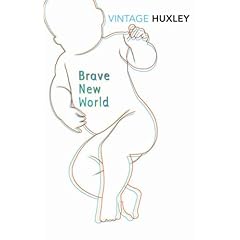 A book set in the future, but has a title inspired by Shakepeare’s The Tempest, Brave New World details a dystopian society. However, if you’re expecting to see shades of Orwell’s 1984, you’re in for a surprise. On the other hand, there are some small comparisons that can be made with Bradbury’s Fahrenheit 451, another dystopian world, where literature is banned. Of course, this is where the similarity ends.
A book set in the future, but has a title inspired by Shakepeare’s The Tempest, Brave New World details a dystopian society. However, if you’re expecting to see shades of Orwell’s 1984, you’re in for a surprise. On the other hand, there are some small comparisons that can be made with Bradbury’s Fahrenheit 451, another dystopian world, where literature is banned. Of course, this is where the similarity ends.
So, no CCTVs, no Big Brother, no society where the police state is taking over. What, then, makes Brave New World a dystopia? Well, ironically enough, it’s that everyone’s happy - happy with their job, their life, and the way things are. There’s a catch (there’s always a catch): everyone in this world is born and bred, in a lab, and effectively, they’re ‘programmed’ to think and act the way they do. Even their happiness is programmed, by hypnopaedia or sleep-teaching; where tapes are played repeatedly to sleeping children, thereby ensuring that the content of these tapes become part and parcel of their personality. The various castes - Alphas, Betas, Gammas, Deltas, Epsilons - are all happy and content being what they are, while simultaneously being happy that they do not belong to a different caste. (Alphas are the intellects, Epsilons the physical laborers)
The main motivation behind creating a world like this is to ensure peace and stability, constant happiness and painlessness. Literature or books from the ancient society are not allowed, for they might actually allow someone to think and perceive beauty of some sort. And beauty, attachment and affection is strongly discouraged. Conversely, recreational sex and drugs (soma) are encouraged. Everyone belongs to everyone else - that’s the fundamental premise. Of course it gets slightly disturbing when we read of children indulging in erotic play, and people being astounded that in the olden days, this was not general practice...
However, this is as much of a story about Bernard Marx, one of the few dissatisfied souls in this pseudo-utopian world, as it is about the world itself. Marx, probably suffering from a complex of sorts due to his physical traits resembling that of the inferior class, Epsilons, is vocal about some of his inhibitions with the society as it stands. The obvious solution, according to him, is to visit one of the ‘Savage Reservations’ - a place where the Old World still survives, and is left untouched and untainted by the advancements of the New World. He visits the Reservation with Lenina, a girl he’s enamored with (a girl who is happy and satisfied with the way things are, and lives up to what she’s imbibed during her childhood sleep-teaching). While she is thoroughly grossed out by this world, Marx feels enlightened, specially on talking to one of the inhabitants of this world, only to learn his mother once belonged to the New World, a world she misses greatly (read, she misses life without soma greatly). Marx and Lenina accompany the two (mother and son) back to their civilization, and the events that unfold as a result keeps the reader hooked on.
This is a world I found difficult to imagine, or for that matter, even live in. Truth be told, I’d rather have been a member of the archaic 1930s Reservation than a part of a world that uniform and surreal. Bizarrely enough, it seems as though, according to Huxley, to be in a world of utter ecstasy, we need to detach ourselves from everything that makes us happy in this world: family, parents, birth, and love. Or, of course, we can take the hedonist approach and fuel up on the real X.
There are hints, some subtle, some not so much, of who various characters of the book are inspired by. The obvious ones are Freud (the Ford, i.e. their equivalent of Lord), Karl Marx, Darwin, Napoleon and Henry Ford (i.e. the founder of Ford Motors), while there are a multitude of references to Shakespeare, Malthus and Wells. It would be really interesting to dig deeper and determine the inspirations for all the characters. Of course, that would make the whole book piece together as well.
If you’re into alternate realities, or the endless possibilities that there are, or, for that matter, how people let their imaginations run away with them, this is a definite must-read. Also, if you enjoyed the likes of 1984, Fahrenheit 451, and Men Like Gods, it’s almost guaranteed that you’ll be fascinated by Huxley’s contribution to the dystopian ideology.
Overall, 8.5 on 10.